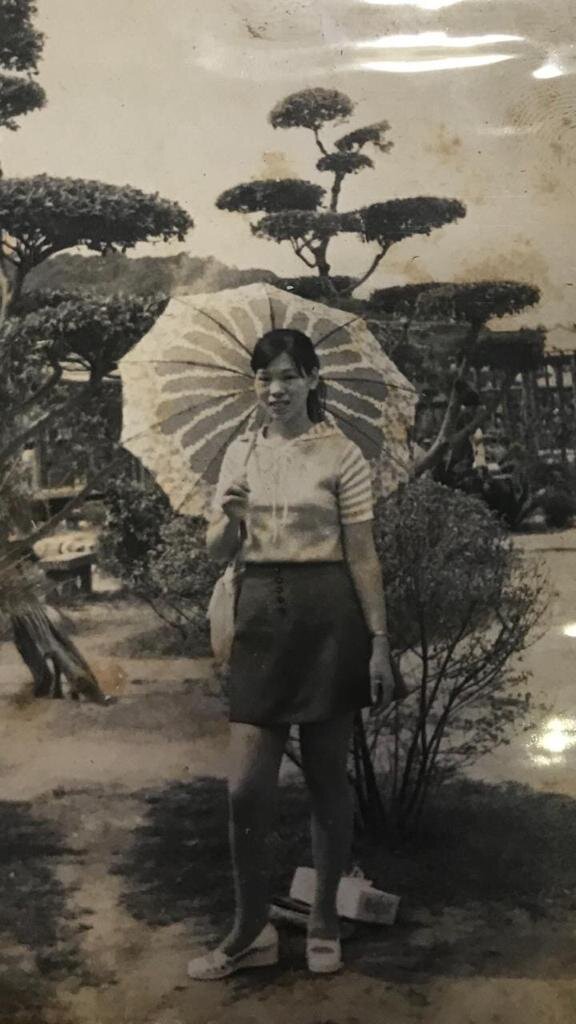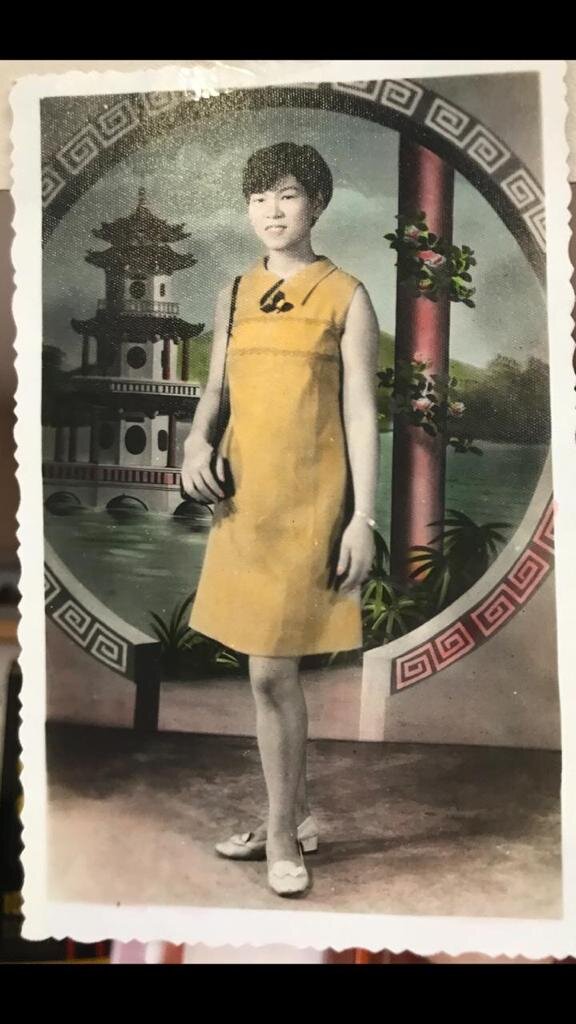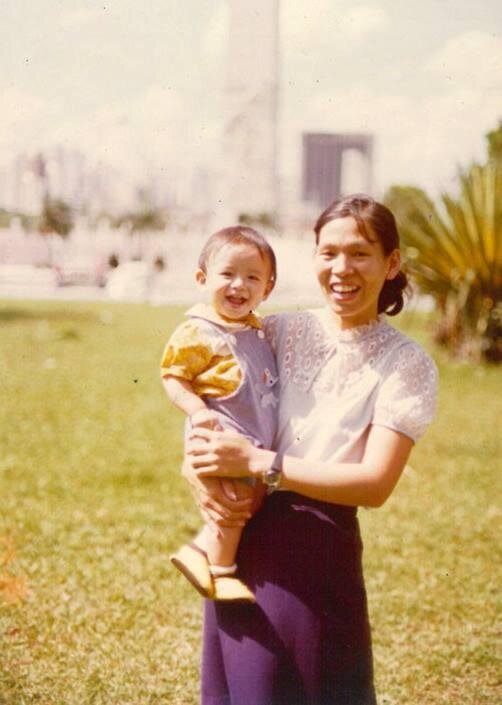Gài Niàn Huà (概念化)
/My mom is a Taiwanese immigrant.
She arrived in Brazil in the early 70s, when she was already around 20 years old. Which means she was raised and educated in Chinese. Today, almost 50 years later, her command of the Portuguese language (which, for those of you who might not know, is one of the most complicated languages in the world) not only fills me with pride and joy, but also inspires me on a daily basis.
The first thing you’ll notice is her thick Taiwanese accent. The second thing is her knack for mistaking Portuguese words that, phonetically, sound very much alike to her Bopomofo trained ears: it’s common that she’ll mistake the words “cadeira” (chair) for “carteira” (wallet / desk); “pneu” (tire) for “pernil” (ham) and “Seattle” (the city in Washington State) for “Cielo” (a Brazilian credit and debit card operator brand). You know, cute little mistakes like that. ;o)
One of these mistakes happened when I was having a conversation with her, about 2 years ago, and I said “conceito” (which means concept, in Portuguese).
She understood “conserto” (which means “repair” in Portuguese).
Which explains why, for the longest time, she had a super hard time understanding what exactly I was doing for a living. In her mind, that made absolutely no sense. I don’t even know how to change a light bulb. How in the world could I be running a repair shop?
Finally, I told her I wasn’t running some kind of repair shop (which would make it a “conserto” business), but instead, I was running a concept agency (which is part of the “conceito” business). She gave me a puzzled look. As expected, she didn’t really get it. And it wasn’t because of any language barrier.
It was because, for people who have never been involved in a creative process, any kind of creative process (from building up an ad campaign at an agency to creating a choreography at a dance studio), it’s really hard to understand – and explain – what a concept is and the role it plays in the creative process.
Obviously, the first thing I did was check out Google Translate and type the verb “conceptualize”. I made sure to translate it into Traditional Chinese, which is the one used in Taiwan. As I pressed ‘enter’, the translation in mandarin read as 概念化 (Gài Niàn Huà). In order to give you a general idea (a VERY GENERAL idea, ok?) of what my mom most likely got from this word, here’s a brief explanation.
There are 3 Chinese characters in the word 概念化 (Gài Niàn Huà).
The first one, 概 (Gài), is the same as the one used in the word 大概 (Dà Gài), which means “probably”, in the sense that you “have an idea”, that you’re not 100% sure.
The second one, 念 (Niàn), is the same as the one used in the word 想念 (Xiǎng Niàn), which means, “to miss something or someone”, in the sense that you’re thinking about something or someone, that you have something or someone in mind.
Finally, the third one, 化 (Huà), means “to transform”.
So, according to Google Translate, that’s what the verb “conceptualize” means in Chinese.
It’s related to an idea, that’s not yet fully formed.
It’s about having something in mind. It means we’re thinking about something.
It has to do with this idea, which we have in mind, going through some type of transformation.
It’s all those things, mashed together, happening simultaneously. (No wonder Chinese is considered the most difficult language to learn in the world).
Looking back, its funny how it all started with me trying to explain to my mom the meaning of the word “concept”. And then, all of a sudden, and I don’t even know how this happened, I caught myself asking her to explain to me, in her own words, the meaning of the word 概念化 (Gài Niàn Huà).
With her unique blend of Portuguese and Chinese, this is what she said:
Her: It’s like when you want to start up a business. You need to have 概念 (Gài Niàn). You gotta ask yourself: what are you going to sell? What kind of product? What’s the interior design of your store going to look like? You have to think about this 概念 (Gài Niàn).
That was way too vague for me. So, I came up with the following fictitious scenario.
Me: Mmmm… Ok mom. Let’s say I want to open up a restaurant. I need to think about the 概念 (Gài Niàn), because that’s what’s going to guide everything else. So, suppose the 概念 (Gài Niàn) is “Fine Vegetarian Chinese cuisine”, I know I’ll need to have bowls, chopsticks, and the primary color in terms of decoration can be red (because it’s Chinese), I won’t be able to serve any kind of meat (because it’s vegetarian) and the menu will be a bit more expensive (because it’s fine dining). Is that it?
Her: That’s it.
Me: And which word would you use, mom, in Portuguese, to sum up everything that I just said?
She stopped and started thinking really hard about it. So hard, I could almost hear her synapsis working.
Her: Ohhh… I mean… it’s like…. “PROJECT”.
Before we continue, let me ask you guys a question: upon reading the word “project”, which of the following definitions comes to your mind first?
Something that is contemplated
An individual or collaborative enterprise that is carefully planned to achieve a particular aim
A piece of planned work or an activity that is finished over a period of time
For some reason, options 2 and 3 are the first ones to pop in my head.
To my mom, it’s option 1.
The one related to the notion of IDEA. The one that is far more ABSTRACT than it is concrete in nature. In other words, the one that best describes the word “concept”. It’s funny. Up until that point, it had never occurred to me to think of “project” as synonymous with “concept”. Against all odds, once again, my mom managed to help me improve my own Portuguese skills. Which sounds crazy, given that I was born and raised in Brazil, whereas she came from a tiny little island located somewhere in the Far East.
Visibly impressed, I continued:
Me: Dang, mom… You’re absolutely right. You got it. Project. Well, if you look up in the dictionary, you’ll find that, in Portuguese, there’s another word for 概念 (Gài Niàn). It’s an idea. Or, as we, creatives, prefer to call it: a concept.
I swear I thought my mom was going to jump out of her seat and yell ‘Eureka’. I thought she was going to have the kind of reaction that is usually reserved for epiphanies and moments of breakthrough. Instead, this is what she said:
Her: Mmm hmmm. Ok. Let’s have dinner. ;o)
Go figure, right? Maybe this is how the wise work. They can feel 100% content knowing that, just by imparting their wisdom, they make everyone involved richer and better, including themselves. And perhaps, that’s good enough for them. They don’t need anything else. No fuss. No buzz. No nothing. The exchange itself is their own eureka moment.
That said, besides being the wisest person I know, my mom also has a ridiculous talent for languages. Other than mandarin, she also speaks Hakka and Minnan (the main dialects spoken in Taiwan), she has a killer level of Portuguese and, at 71 years old, in the middle of a pandemic, she is pouring her heart and soul into one single mission: learning English.
Yes. You read it right. I said KILLER. After all, how many Taiwanese immigrants do you know who, instead of “hopefully”, says “God-willing”?
Instead of “from whence it came”, uses “whence it came”.
And who knows how to explain the concept of… well, “concept”? In both Chinese AND Portuguese?
Speaking of which, have you guys ever heard of a concept known as Third Culture Kid (TCK)? It refers to children whose first culture is the one taught within their home (for example, Chinese culture), the second culture is the one they pick up outside of their home (for example, Brazilian culture) and the third one is an amalgamation of the previous two, something they develop out of sheer survival instinct. There are millions of such people around the world. Including my sisters, my cousins and myself.
From personal experience, I can safely say that the relationship between immigrant parents and their TCK offspring is often built on a bedrock of disagreements, fights and discussions. Which is perfectly understandable, given the differences in repertoire, culture, habits, values and languages that exist between both generations.
However, also from personal experience, I’m proud to say that when the dust settles and the nerves calm down, what’s left is an almost inexplicable sense of obsequious respect displayed by the children towards their parents. Combined with an immense admiration for the parents’ grit, courage and perseverance to go after a better life for themselves and their children, away from everything and everyone. And finally, an indescribable sense of gratitude for all the sacrifices they made for us.
That’s exactly how I feel about my mom. I have the utmost sense of respect for her story. A deep admiration for how far she came in her own journey. And an endless gratitude for the human being I’m lucky to call my mother. I also have two sisters, one older and one younger. And I believe I speak for both of them when I say that, when it comes to how we feel about our mom, we’re way beyond repair: we are and always will be her number 1 fans.
And you know what? Time and time again, my mom keeps showing us that we have every reason to be.
Lucky us.





